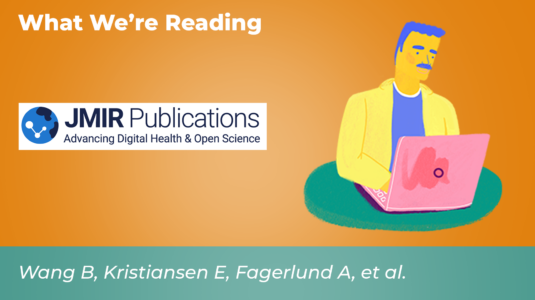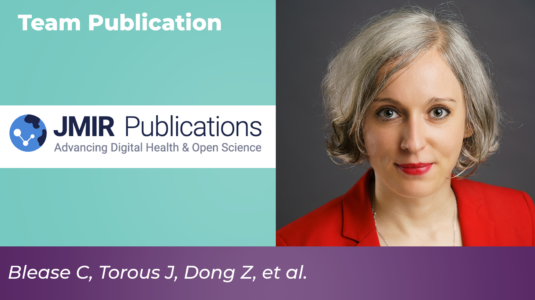This study by Vanka, et al, presents 10 guidelines for patient-centered medical documentation, emphasizing respect, clarity, and inclusivity in clinical notes. These principles aim to empower patients, improve trust, and enhance medical education on open notes practices.
Blease, Charlotte
Users’ experiences with online access to electronic health records in mental and somatic health care: Cross-sectional study
[…] This study aimed to provide insight into the impact of PAEHR [patient-accessible electronic health records] on patient care, particularly for those with mental health conditions, and to inform clinical strategies to improve the use of PAEHR in health care settings. The transition toward EHR accessibility may present health care professionals with a unique opportunity to change how they think and write about patients.
Patient online record access in English primary care: Qualitative survey study of general practitioners’ views
This study provides timely information on the views of GPs in England regarding patient access to their web-based health records. Overwhelmingly, GPs were skeptical about the benefits of access both for patients and to their practices.
Open notes in patient care: confining deceptive placebos to the past?
In some countries, the practice of “open notes” is advanced with patients using online portals to access their clinical records. In this report, the authors reflect on the consequences of access for placebo prescribing, particularly for the common practice of deceptive placebo use, in which patients are not aware they are being offered a placebo.
Sharing Clinical Notes Potential Medical-Legal Benefits and Risks
It is possible that greater mutual understanding and strengthened patient-physician communication could promote better health outcomes and reduce patients’ inclination to litigate even when medical errors do arise. Verifying the potential effects of sharing clinical notes on malpractice liability risks will require thorough study and monitoring.
Sharing Clinical Notes and Electronic Health Records With People Affected by Mental Health Conditions: Scoping Review
PAEHRs in MHC may strengthen user involvement, patients’ autonomy, and shift medical treatment to a coproduced process. Acceptance issues among health care professionals align with the findings from general health settings. However, the corpus of evidence on digital sharing of EHRs with people affected by mental health conditions is limited. Above all, further research is needed to examine the clinical effectiveness, efficiency, and implementation of this sociotechnical intervention.
We need to talk about “closed notes”
In this personal blog, the author discusses the harmful consequence of “closed notes” – of denying patients rapid access to their online clinical information. The blog post describes “closed notes” as an inherited structure in healthcare but urges that this does not make it right.
The benefits and harms of open notes in mental health: A Delphi survey of international experts
This survey used a Delphi poll – an established methodology used to investigate emerging healthcare policy, including in psychiatry. International experts who included health professionals and persons with lived experience of mental healthcare were asked to give their opinions, anonymously, in three rounds of online surveys, and to offer their views about the potential benefits and harms of online access to mental health notes. Experts – drawn from 70 experts from six countries – agreed patients’ access to their mental health notes could offer multiple benefits and few harms.
A step-by-step guide to peer review: a template for patients and novice reviewers
The peer review template for patients and novice reviewers is a series of steps designed to create a workflow for the main components of peer review. While relatively novel, patient peer review has the potential to change the healthcare publishing paradigm. It can do this by helping researchers enlarge the pool of people who are welcome to read, understand and participate in healthcare research. Academic journals who are early adopters of patient peer review have already committed to placing a priority on using person-centred language in publicly available abstracts and focusing on translational and practical research.
How do older patients with chronic conditions view reading open visit notes?
Authors examined the experiences with and perceptions of the effect of reading clinical outpatient visit notes on older adult patients with multiple chronic conditions at three healthcare organizations with significant experience sharing clinical notes with patients. The majority of respondents had read two or more clinical notes in the 12 months before the survey. Patients with more than two chronic conditions were more likely than those with fewer or none to report that reading their notes helped them remember their care plan, take their medications as prescribed, and understand and feel more in control of their medications. Very few patients reported feeling worried or confused about their health or medications due to reading their notes.






